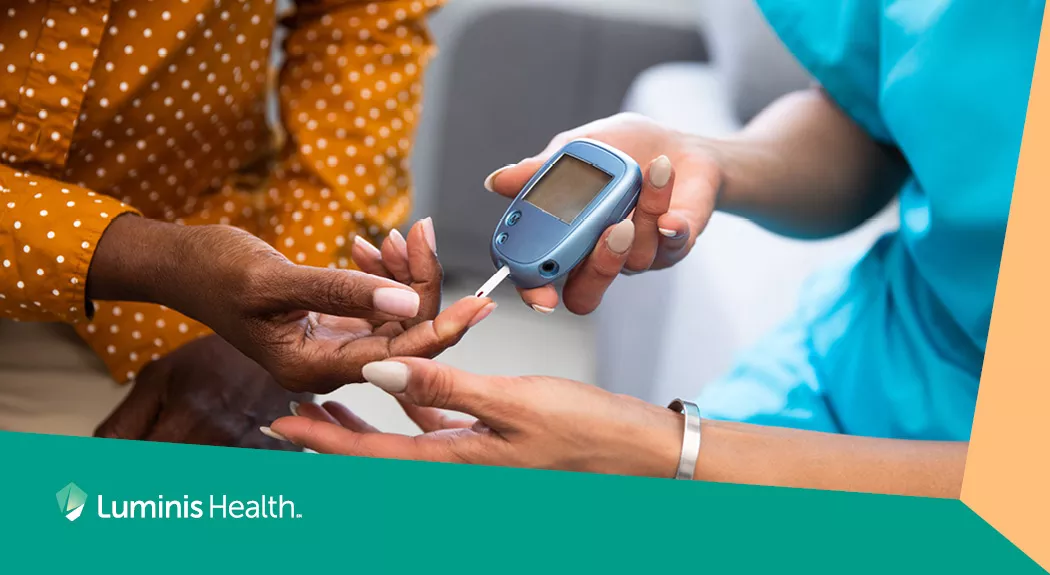Effective January 20, 2026, masks are encouraged for all staff, patients and visitors at all Luminis Health locations and will remain encouraged through the end of the influenza season. Thank you for your patience as we continue to care for our community.

According to the Maryland Behavioral Risk Factor Surveillance System, 10.5 percent of Maryland adults have diabetes, with obesity or being overweight the most significant contributing factors (65.2 percent) to diabetes risk. Thirty-four percent, or approximately 1.6 million, of Maryland adults have prediabetes according to the Centers for Disease Control and Prevention (CDC).
In 2019, the prevalence of diabetes in the state of Maryland led the state to deploy its own action plan to combat diabetes and support diabetes risk awareness. Following the state’s lead, Luminis Health placed diabetes on its list of top metrics that are being regularly tracked for quality and performance.
Recognizing Risk Factors
Diabetes risk factors include:
- Being overweight or obese
- Age (risk increases as age increases)
- Sex (males are more likely to develop diabetes)
- Race/Ethnicity (African American, American Indian, Asian American, Hispanic/Latino, and Pacific Islanders have a higher prevalence of diabetes than non-minority individuals)
- Poor nutrition and lack of physical activity
- Tobacco use
- Prediabetes and gestational diabetes
- Social determinants such as the lack of access to resources, income and higher-level education
Diabetes is more common among people who are members of some ethnic minority groups and groups with lower socioeconomic status. This exemplifies why Luminis Health created its HEART Force. This group of trustees, leaders and staff, clinicians, community stakeholders and public health partners worked together to develop a plan for building a more equitable and just health system.
Working to Provide Health Equity
The HEART Force’s recommendations for Luminis Health fall into three major categories:
- Lead as an inclusive organization; confront and eradicate inequities in health care.
- Enhance culturally informed communications and community collaboration.
- Measure and integrate accountability.
What does this work look like to reduce health disparities related to diabetes? Our team hosts education and exercise series in our communities. These programs are funded by a Maryland Community Health Resources Commission grant. We also work closely with impacted and at-risk patients to directly support the development and management of healthy blood sugar levels. As part of this initiative we provide patients with individual glucose monitors and equipped them with weekly plans for healthier lifestyles.
Seeing Real Results
Luminis Health’s collaboration with community health programs for diabetes support and prevention is yielding tangible results. One of our community health equity goals is for 75 percent of our diabetic patients over the age of 18 to have an A1C test result of less than 8 percent, which is a healthy goal for most people with diabetes. From October to December, 74 percent of our diabetic patients fit this criteria.
The A1C test—also known as the hemoglobin A1C or HbA1c test—is a simple blood test that measures your average blood sugar levels over the past 3 months. It’s one of the commonly used tests to diagnose prediabetes and is also the main test to help diabetics and their healthcare team manage the disease. Higher A1C levels are linked to diabetes complications, so reaching and maintaining your individual A1C goal is important for diabetics.
Managing Your Diabetes with Luminis Health
Our Luminis Health Primary Care team strives to work with patients to help them achieve the best control of diabetes. In-office A1C testing and regularly scheduled visits allows medical providers to make meaningful changes to diabetes management. By focusing on patients’ specific needs we can customize a diabetic management plan and help them access the resources they need to better manage their care.
Knowing the ABCs to diabetes and your personal goals is the key to success.
A1C: You and your provider should have an agreed upon goal A1C target. You should have monthly office visits until you achieve that goal. In each visit you can discuss what is working, where help is needed, and any barriers to care.
Blood pressure: If you have diabetes it is critical to have your blood pressure under control. Based on your medical conditions, providers will give you a specific Blood Pressure goal. Getting blood pressure to goal may require lifestyle changes and medications.
Cholesterol: It is also critical for patients with diabetes to have good control of their LDL (low-density lipoprotein) Cholesterol (often called “bad” cholesterol). Diet, exercise, and medication can help you achieve your LDL goal.
Diet: Understanding which foods increase your blood sugar is critical to gaining control of your diabetes. Working with your health care providers and dieticians/diabetic educators is key in understanding the challenges of managing diabetes and controlling this condition.
Exercise: Working with your healthcare providers to design an exercise plan specific to your needs is crucial to manage diabetes. Healthy exercise habits will lead to better control of your diabetes.
Follow-up: Regular follow up with your health care team is critical to your
The Luminis Health diabetes team includes doctors, nurses, diabetes educators, registered dietitians, physical therapists, speech and language therapists, behavioral health specialists, and occupational therapists. We provide the full range of diabetes care for children and adults with Type 1 and Type 2 diabetes, as well as any diabetes complications.
Luminis Health is here to:
- Educate you on how to live a healthy and full life with diabetes.
- Monitor your condition so we can catch and treat any complications at an early stage.
- Provide all the treatments you need, including medications, technology supports, physical therapy, nutrition counseling and more.
Reducing health disparities and any instance where the health outcomes of our patients are less than the best possible is part of the reason Luminis Health continues a journey dedicated to justice, equity, diversity and inclusion. Learn more about our JEDI journey here.
Learn more about Luminis Health’s comprehensive diabetes resources here.
Tamiko Stanley, vice president and chief JEDI officer
Dr. Andrew McGlone, executive medical director – primary care and population health
